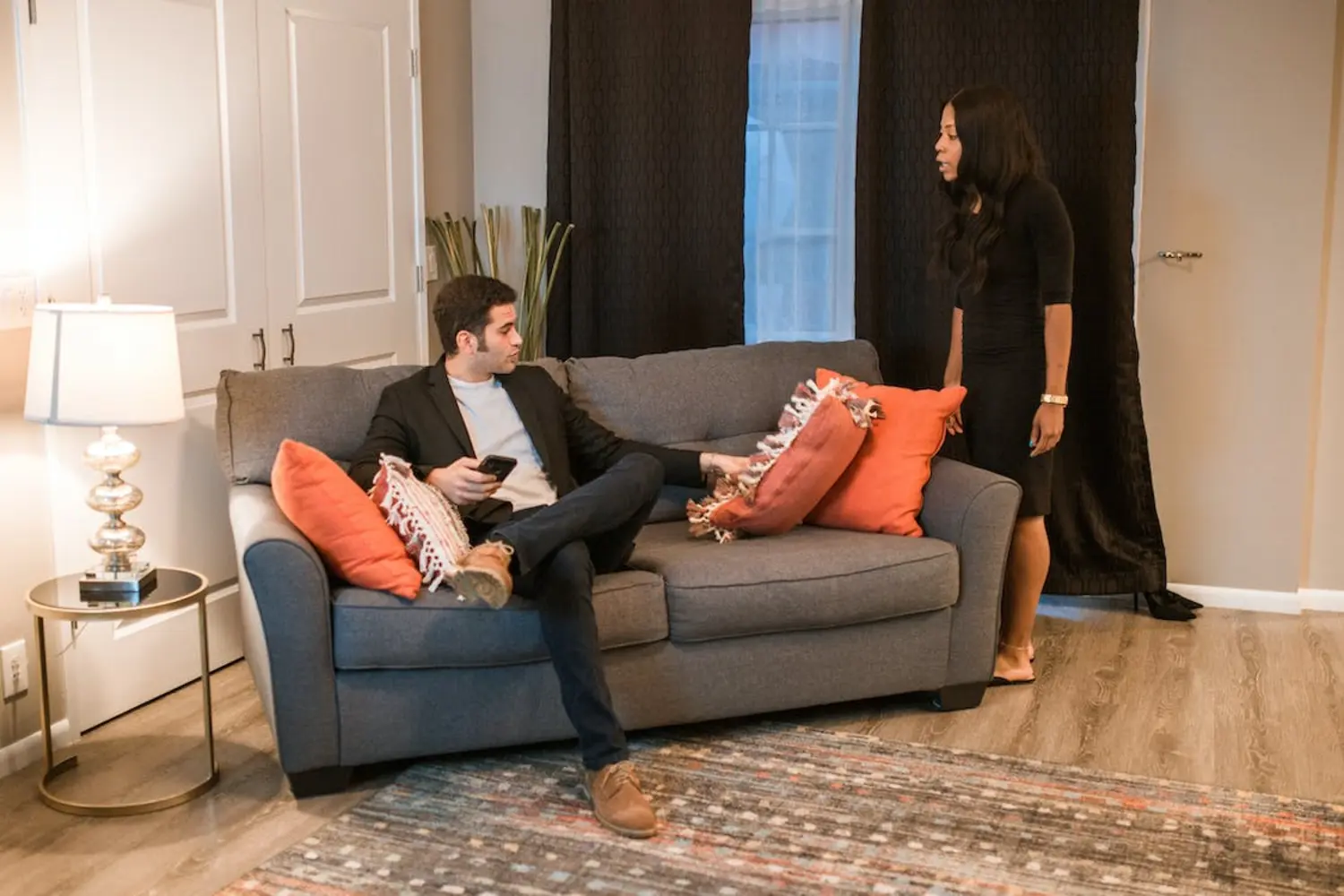Have you ever noticed the way he hangs onto your every word, almost as if he is addicted to hearing you speak? Or have you noticed how his text messages seem to come in a relentless stream of neediness? If so, it’s possible that he is emotionally dependent on you.
Emotional dependence is an unhealthy reliance on another person for emotional validation, which can cause major relationship problems.
It’s important to recognize the signs and take steps to address them – for both your sakes. With awareness and understanding, relationships can not only survive this type of dependence but grow and strengthen as a result.

Signs He Is Emotionally Dependent On You
It can be devastating to discover that someone has become emotionally dependent on you. Emotional dependency is commonly characterized by excessive neediness and a fear of abandonment.
The signs of emotional dependency include demands for constant reassurance, an unwillingness to let you out of their sight, an urge to control your decisions, and excessive jealousy.
If you notice any of these behaviors in your partner, it’s important to address the issue quickly before it becomes an even greater problem. Facing the challenge head-on provides an opportunity for both parties to foster healthier relationships with more independence and freedom.
10 Signs He Is Emotionally Dependent On You
1. They Constantly Seek Your Reassurance
Your Partner May Constantly Seek Reassurance From You About Their Choices, Actions, And Decisions.
Your partner’s need for reassurance can be a sign that they are emotionally dependent on you. This could manifest in different ways, such as needing verbal or physical reassurance of their decisions or choices, asking for validation of their actions, or seeking permission before making any move.
They may also be more hesitant to make decisions without first consulting you, and may even look to you for advice during times of uncertainty.
These behaviors are often rooted in insecurity and can indicate that your partner has come to rely on you for emotional support and stability.
Often this type of behavior will become more frequent and intense when your partner is feeling overwhelmed, anxious, or insecure about certain aspects of life.
It is important to recognize these signs so that both partners can work together to establish a healthy balance and open communication about their needs.
2. They Struggle To Make Decisions Without You
Your Partner May Rely On You To Make Decisions For Them Or Struggle To Make Decisions Without Your Input.
Your partner’s emotional dependence on you can be seen through their struggles to make decisions without your input. They may come to you for advice or direction, looking for guidance before making any serious choices.
When left to decide things on their own, they may feel overwhelmed and unsure of what to do. This dependency can also manifest in other ways, such as relying on you for emotional support when they’re feeling down or anxious or having difficulty managing their stress levels.
This reliance could potentially lead them to take extreme measures in order to get a desired result, such as becoming overly aggressive or passive-aggressive in order to manipulate the situation in their favor.
This is a sign that your partner trusts and values your opinion but finds it difficult to make decisions on their own.

3. They Need Constant Contact With You
Your Partner May Feel Anxious Or Insecure When They Are Not In Contact With You.
In a relationship, some individuals may exhibit a strong need for constant contact, where they feel anxious or insecure when they are not in touch with their partner.
This behavior can stem from various factors, such as attachment styles, past experiences, or personal insecurities. Understanding the dynamics behind this need for constant contact is crucial for maintaining a healthy balance in the relationship.
When your partner exhibits a strong need for constant contact, it can be an indication of their reliance on you for emotional reassurance and security.
They may feel a sense of anxiety or insecurity when there is a lack of communication or when they are unable to reach out to you. This behavior can manifest in several ways, including frequent texting, calling, or checking in on you throughout the day.
4. They Get Jealous Easily
Your Partner May Get Jealous Or Possessive When You Spend Time With Others, Even If It Is Just For A Short Period.
Your partner may show signs of being emotionally dependent on you if they get jealous easily even when you spend time with others, even if it is just for a short period of time.
They may be more protective and possessive of your time, wanting to know the details of who you are with and how long you plan to be away.
If they try to control where you go or who you associate with, this could also be a sign that they are overly clingy or dependent on you for emotional support.
Other signs of dependence include constantly reaching out for reassurance from you or needing constant reminders of how important they are in your life.
They may worry excessively about your feelings towards them, or feel insecure when you are away. These behaviors can lead to feelings of guilt or resentment if not addressed properly.
Depending on the severity of their jealousy and insecurity, these behaviors may indicate that your partner is emotionally dependent on you for validation and support.
5. They Have Difficulty Managing Their Emotions
Your Partner May Struggle To Manage Their Emotions Without Your Support, Becoming Overly Emotional, Or Lashing Out In Anger.
Your partner may have difficulty managing their emotions, especially when they are feeling overwhelmed. This could manifest as lashing out in anger and becoming overly emotional.
They may be emotionally dependent on you for support, needing reassurance and understanding when things become too much to handle alone.
Signs of this may include them seeking your comfort or advice on how to manage their emotions, needing consistent validation from you about their feelings, and relying heavily on your opinion for direction in difficult situations.
Additionally, they may be prone to negative self-talk, rumination over events in the past, and an inability to move beyond a certain emotion without external guidance.
It is important to recognize these signs early on and provide the necessary support they need so that they can learn how to cope with their emotions in a healthy way.

6. They Have Low Self-Esteem
Your Partner May Have Low Self-Esteem And Depend On Your Validation To Feel Good About Themselves.
Signs that your partner may be emotionally dependent on you include constantly seeking approval and validation from you, putting your needs before their own, showing signs of low self-esteem when not around you, feeling threatened when you spend time away from them, becoming jealous easily, or feeling lost without you.
They may also have difficulty making decisions without consulting with you first, rely on continual reassurance from you in order to feel secure or demonstrate a lack of confidence in their own ideas and opinions.
Furthermore, they may become excessively clingy or possessive towards you and view their self-worth as being determined by how much attention they receive from you.
7. They Avoid Making Changes Without Your Input
Your Partner May Be Resistant To Making Changes In Their Life Without Your Input Or Support.
Your partner may exhibit signs of emotional dependence on you if they avoid making changes in their life without your input or support.
This could manifest as difficulty with decision-making, relying on you for advice, frequent communication to check in about decisions, and general uncertainty around taking action.
Furthermore, you might notice that rather than growing in independence and autonomy, your partner turns more to you for guidance and direction.
When faced with a problem or challenge, they may look to you to provide solutions rather than express ownership over the situation themselves.
These behaviors suggest that your partner is emotionally dependent on you as they feel safer relying on your opinion and judgment rather than having to make decisions or take risks on their own.

8. They Have Trouble Being Alone
Your Partner May Struggle To Be Alone, Always Needing Someone Around To Feel Safe Or Secure.
Signs that your partner is emotionally dependent on you may include constantly seeking out companionship, needing frequent reassurance and validation, and expressing feelings of insecurity when apart from you.
They may also act clingy, become overly possessive of your time and attention, or turn to you for emotional support in times of distress.
In addition to these outward symptoms, there may be a sense of unease or even panic when left alone for extended periods – a common sign of emotional dependency.
If you notice that your partner has difficulty being alone or feels a need to always have someone around to feel safe or secure, this could be an indicator that they are depending on you more than they should.
9. They Prioritize Your Needs Above Their Own
Your Partner May Put Your Needs Above Their Own, Even To Their Detriment.
Signs that your partner is emotionally dependent on you may include them only being happy when you are around, being overly clingy and constantly needing reassurance from you, or expecting to be taken care of by you.
They may feel the need to constantly check in with you or require frequent contact. They could be jealous of your time spent with others and become moody when you don’t immediately respond to their messages.
Your partner might also make decisions based on what will please you instead of what would be best for them, even if it causes them harm in the long run.
Furthermore, they may have difficulty expressing negative emotions without your help or support and rely heavily on you for validation.
10. They Rely On You For Their Happiness
Your Partner May Rely On You To Make Them Happy, Believing That Their Happiness Depends Entirely On Your Relationship.
Q: What Does It Mean If My Partner Is Emotionally Dependent On Me?
A: If your partner is emotionally dependent on you, it means that they rely heavily on you for their emotional needs and well-being. They may have difficulty regulating their emotions without your support and may become anxious or distressed when you are not available to them.
Q: Is It Healthy For My Partner To Be Emotionally Dependent On Me?
A: No, it is not healthy for your partner to be emotionally dependent on you. Emotional dependence can create an unhealthy dynamic in your relationship, where your partner’s emotional well-being becomes your responsibility. This can lead to resentment, burnout, and an imbalanced power dynamic.
Q: Can Emotional Dependence Be Overcome?
A: Yes, emotional dependence can be overcome with therapy, self-awareness, and a willingness to work on building healthy emotional habits and coping mechanisms. However, it may require time and effort on both your part and your partner’s to make lasting changes.
Q: How Can I Support My Partner In Overcoming Emotional Dependence?
A: You can support your partner by encouraging them to seek therapy or counseling, helping them identify healthy coping mechanisms, setting boundaries around your own emotional availability, and being patient and understanding as they work on building their emotional independence.
Q: What Are Some Healthy Ways To Cope With Emotional Dependence?
A: Some healthy ways to cope with emotional dependence include practicing self-care, engaging in activities that bring you joy and fulfillment, seeking support from friends and family, practicing mindfulness and relaxation techniques, and learning healthy communication and boundary-setting skills.
Q: Can Emotional Dependence Lead To Codependency?
A: Yes, emotional dependence can lead to codependency, which is a dysfunctional relationship dynamic where one partner becomes overly reliant on the other for their emotional needs and well-being. Codependency can lead to unhealthy behaviors such as enabling, controlling, and enabling addictive behaviors.
Q: Can Emotional Dependence Be A Sign Of A Deeper Mental Health Issue?
A: Yes, emotional dependence can be a sign of deeper mental health issues such as anxiety, depression, or attachment disorders. If you or your partner are struggling with emotional dependence, it may be helpful to seek professional support from a therapist or mental health provider.
Q: What Should I Do If My Partner Is Unwilling To Address Their Emotional Dependence?
A: If your partner is unwilling to address their emotional dependence, it may be necessary to re-evaluate the dynamics of your relationship and consider whether it is healthy and sustainable for you in the long term.
It may also be helpful to seek support from a therapist or counselor to process your emotions and explore your options.

Hi, I’m Jasmine Sophie and welcome to my website!
As a marriage counsellor, I’m passionate about helping people figure out solutions to their relationship issues. While based in Austin and with most of my clients coming from the local area, I believed that there were more people out there who could benefit from my services.
That’s why I decided to set up this webiste; so that I can help even more people break through any difficulties they may be facing in their relationships. In my free time, I enjoy activities like golfing and fishing, as well as just spending time with family. It’s just another way for me to explore my creativity and use it towards helping others.
Experience:
With a wealth of experience in the realm of love and relationships, Jasmine has been transforming lives for over a decade. Her remarkable journey as a licensed psychologist and marriage and couples therapist has allowed her to witness the transformative power of love firsthand. Through her extensive work with diverse couples, she has unraveled the secrets to fostering healthy and thriving partnerships.
Expertise:
Jasmine’s expertise lies in untangling the complex web of relationship dynamics. Whether it’s reigniting the spark in long-term marriages, healing wounds from past relationships, or guiding individuals in their pursuit of true love, Jasmine possesses an unwavering commitment to helping people create fulfilling and joyful connections. Her profound insights and practical strategies have earned her accolades as a trusted authority in the love and relationship sphere.
Education:
Jasmine Sophie’s academic achievements serve as a solid foundation for her exceptional knowledge in the field. She holds a master’s degree in Psychology, specializing in marriage and family therapy. Combining her academic prowess with her empathetic nature, Jasmine seamlessly integrates evidence-based techniques and profound wisdom to empower her readers to navigate the complexities of modern relationships with grace and authenticity.
Join Jasmine Sophie on joypassiondesire.com, and embark on a transformative journey to embrace love, ignite passion, and cultivate relationships that transcend ordinary boundaries. Through her illuminating articles and expert guidance, she will empower you to create a love story that is worthy of celebration and admiration. Get ready to embark on an extraordinary adventure of love and self-discovery with Jasmine Sophie as your trusted guide.
